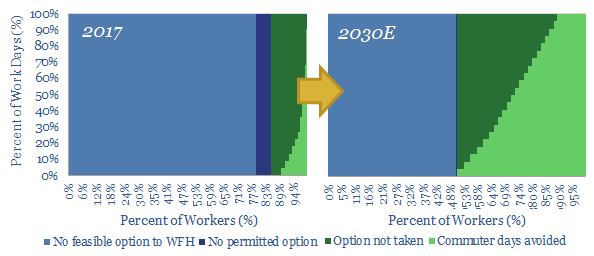The COVID-19 crisis will structurally accelerate remote working. The opportunity is explored in our 21-page report. It can save 30% of commuter journeys by 2030, avoiding 1bn tons of CO2 per year, for a net economic benefit of $5-16k per employee. This makes remote work a materially more impactful opportunity than electric vehicles in the energy transition.
Remote work currently saves c3% of all US commuter miles, which comprise 33% of developed world gasoline demand (pages 2-4).
Remote work could save 30% of all commuter miles by 2030, structurally accelerating as the COVID-19 crisis changes habits (page 5).
Remote work, thus screens as more impactful than electric vehicles, as an economic opportunity in the energy transition (page 6).
Ecconomic benefits are $5-16k pp pa. Our numbers are conservative. They under-reflect productivity and wellbeing improvements in the technical literature (pages 7-8).
We stress test our numbers, looking profession-by-profession across the entire US labor force, and considering new technologies (pages 9-13).
Direct energy impacts save 1bn tons of annual CO2. Impacts on oil, gas and electricity demand are quantified, including evidence from the COVID crisis (pages 14-17).
Hidden consequences are more nuanced: reshaping mobility, urbanization and online retail habits (pages 18-21).

